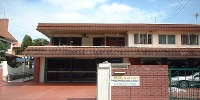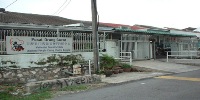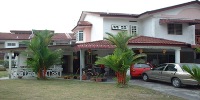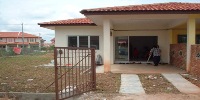35歲圓“讀書”夢(吉隆坡)他從小到大的夢想是進入學校唸書,這個一般人眼中可輕易達成的事,他卻要在35歲之后才能完成!
發高燒患小兒痳痺症
因為他出世3個月時發了一場高燒,患上小兒痳痺症,家中長輩覺得這是一件羞恥的事,怕太多人知道,於是不讓他上學。
所以他小時候看到弟弟妹妹們去上學時,心里很羨慕,立志要去學校唸書。
直到35歲左右,他終於有機進入小學了,不過並不是做學生,而是當圖書館管理員。
他是張楨健,如果不是小時候他向弟弟“請教”,自己肯用心摸索,現在他可能會是文盲。
能閱讀簡單華文書籍
來自哥打白沙羅的楨健說,他現在能閱讀簡單的華文書籍和掌握普通的馬來文和英文詞匯,這是他這些年來努力自修的成果。
他說,他很喜歡目前的工作,這份工作圓了他想進學校唸書的夢想。
楨健目前在甲洞二校任職圖書館管理員。他感謝校方和學生在工作上給以的協助,並希望能長久在此工作。
楨健的情況是,左手和右腳可以活動,但是右手和左腳無力。
婆婆勸媽媽放棄
楨建險成棄嬰
提起往事,楨健相當感慨。他說,這事令他自小就不喜歡婆婆。
“媽媽告訴我,當我被證實患上小兒痳痺症後,婆婆曾勸媽媽放棄我,把我留在醫院,不要帶回家。”
“可是媽媽沒有狠下心腸,她告訴婆婆,我始終是她的骨肉,她不能就此拋棄我。”
他說,當時父親需到外工作,而母親是割膠工人,清晨就需到膠園工作,婆婆因為他是殘障兒,而聲明不照顧他。
從沒埋怨過父母
楨健說,因為父母的堅持,他才不至於成為孤兒。所以他從沒埋怨過父母,不過卻無法原諒婆婆,自小就很少和婆婆講話。”
除了險成棄嬰之事,另一件影響楨健至今,造成最大傷害的事是沒有讓楨健上學。
“因為我姐姐也患小兒痳痺症,她是在出世4個月大時得此病,不過她的情況好一些,她還可以走路。婆婆說,家里已經有一人殘障,上學時被人指指點點,不想我再去上學再讓人嘲弄。”
楨健說,家里除了他和姐姐殘障之外,其他弟妹都健全。
弟弟教導及自修
楨健能識字閱讀
“我15歲那年,弟弟開始唸小學,他第一天上學時,我看到他的校服很漂亮,心里很羨慕,很希望自己有機會穿上。”
“那天我等到弟弟放學回來,我向他借校服穿上,以滿足自己,但是我非常清楚一切都是假象。”
“我每天等弟弟回來,要他教我唸書認字,我是在這樣環境下長大和慢慢識字。”
楨健說,除了通過弟弟的教導,他的識字能力是通過電視節目逐慚一點點累積。
他說,他現在能夠識字和閱讀,但是書寫的能力還很弱。
他說,那時他都是看華文書,所以他不會馬來文和英文,另外,他也只是學會認字,可是完全不會寫。
華文能力只有中學程度
楨健說,現在他的華文能力只到中學程度,文字較深的書籍,他看不懂。
“初在圖書館任職,當閱讀中學程度書本時,我一行文字中有好多字不會,經過3年的努力自修,一行文字我已經可以讀出來,只是迅速比較慢。”
圖書館的工作讓楨健有更多機會與書為伍,彌補自小無法唸書的遺憾,也滿足他的求知慾。
從本身事件中,楨健體會到殘障人更需要學習機會,同時也希望社會人士多給殘障人士工作機會。他相信只要有機會,殘障人會比正常人更珍惜學習和工作的機會。
最喜歡歷史書籍
盼考取證書文憑楨健說,他是在11年前才從家鄉來吉隆坡尋找工作,那時他是想到父母已老,有朝一日他要自己獨立生活,為了自己未來著想,他才只身出外找工作。
這些年來,他做過幾份工,包括在電子廠工作和在報社發行部工作。
楨健說,在來甲洞二校工作之前,他也在八打靈再也培才小學擔任過圖書館管理員,只是那裡的圖書館在樓上,他行動不便,所以只做18個月就離職。
“當初聽說可以在圖書館工作時,我好開心,因為終於可以完成進入校園的夢想了。”
楨健最喜歡閱讀歷史書籍,他希望可以在這方面考取一張證書或文憑。
“可是我不知道如何去尋找這方面的資料。”
他希望有人可以提供這方面的資料。
楨健已婚,妻子是名教師,倆人是在美門殘障中心認識。妻子也是他的老師,他閱讀時遇到難題,就會向妻子請教。
真情人物姓名:張楨健
年齡:39歲
家境:已婚。
遭遇:小時因一場高燒而患上小兒痳痺症,長輩們覺得是件羞恥的事,不讓他上學,導致他沒有機會上學唸書,只靠弟弟教導及自修。他卅多歲成為小學圖書館管理員,完成進入校園的夢想。 (星洲日報/大都會‧2007.05.14)
摘自:
http://www.sinchew-i.com/article.phtml?artid=200705140368&data=scnews&spid=34715














